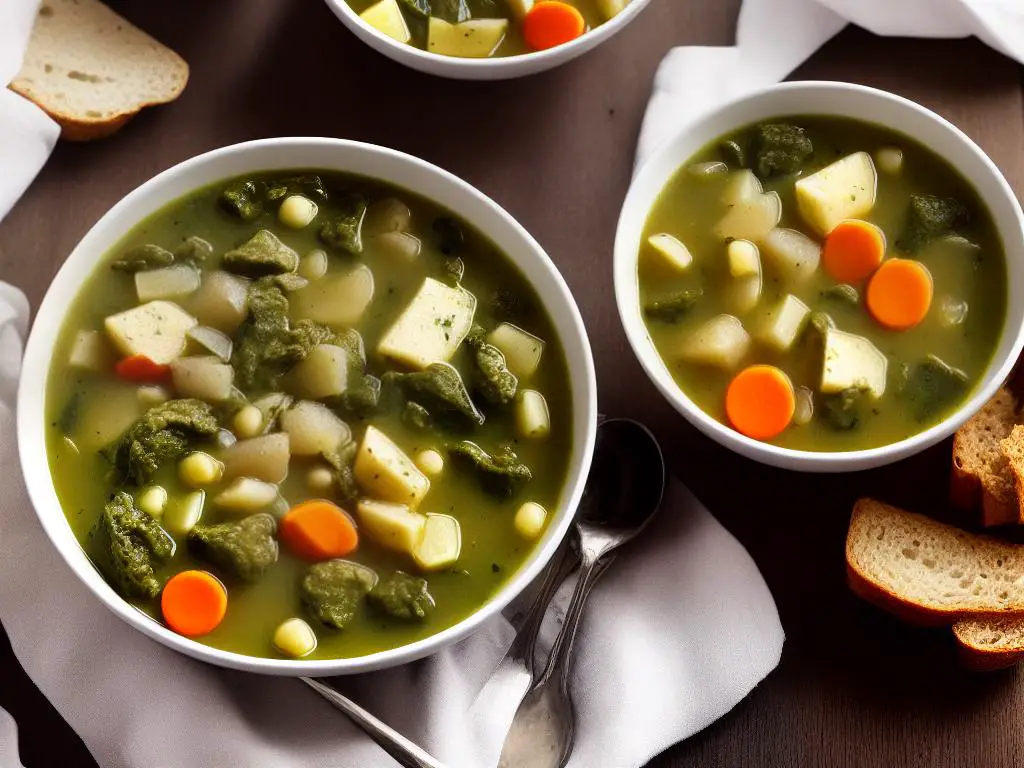Delving into the fascinating world of McDonalds Portugal’s menu, we find an intriguing adaptation of traditional Portuguese cuisine – Caldo Verde. By exploring its historical introduction, unique ingredients, and the overall impact on the business and customer satisfaction, we gain valuable insights into the blending of global fast-food giants with the rich culinary heritage of Portugal. This essay will endeavour to provide a comprehensive analysis of the presence and significance of Caldo Verde within McDonalds Portugal’s offerings.
History of Caldo Verde in McDonalds Portugal
Caldo Verde
Caldo Verde is a traditional Portuguese soup, known for its vibrant green colour and simple, yet satisfying flavour profile. It has been a beloved staple in Portuguese cuisine for centuries, with its origins dating back to the Minho province in the north of Portugal. Made from a base of potatoes, onion, garlic, and kale or collard greens, this hearty soup has been a source of comfort and nourishment for generations of Portuguese families.
McDonalds Portugal’s Adaptation of Caldo Verde
McDonalds has long been known for adapting its menu offerings to suit the local tastes and preferences of their customers around the world. Portugal is no exception to this trend, as McDonalds Portugal has incorporated Caldo Verde as a part of its standard menu offerings. Recognizing the popularity and cultural significance of this dish, McDonalds’ decision to serve their own version of Caldo Verde demonstrates their commitment to localizing their brand and catering to the tastes of their Portuguese patrons.
The introduction of the Caldo Verde soup to McDonalds Portugal’s menu is widely attributed to the desire for healthy and lighter menu options that still embody the essence of local flavours. The choice to include a traditional Portuguese dish was a strategic one, as it helps the fast-food giant connect with locals on a deeper level. Furthermore, the incorporation of Caldo Verde as part of McDonalds’ offerings is an acknowledgment of the importance of authenticity and tradition in Portuguese culinary culture.
Factors Influencing McDonalds Portugal’s Decision to Offer Caldo Verde
As more people around the world become increasingly health-conscious, fast food chains like McDonalds are continually challenged to offer more nutritious and diverse menu options. In an effort to cater to changing consumer preferences and demand for healthier options, McDonalds Portugal likely found that adding a dish like Caldo Verde would not only address these changing needs but also serve as a nod to the country’s rich food history.
Another factor contributing to McDonalds’ decision to add Caldo Verde to their menu could be the rise in popularity of soup as a menu item in general. Soup has long been regarded as a simple and satisfying meal option that can easily cater to a variety of dietary preferences and restrictions. By offering a well-known and beloved soup option like Caldo Verde, McDonalds Portugal is able to satisfy the appetites of customers looking for a familiar and comforting meal without straying too far from their typical fast-food experience.
Finally, adding Caldo Verde to McDonalds Portugal’s menu may also serve as a form of brand localization and differentiation. By including a dish like Caldo Verde on their menu, McDonalds Portugal has an opportunity to connect on a deeper level with Portuguese customers, demonstrating that they value and appreciate the country’s unique food culture and history. Additionally, this inclusion helps to set McDonalds Portugal apart from its competitors, offering a distinct menu item that other fast food chains in the region may not offer.
Conclusion
McDonald’s Portugal’s addition of Caldo Verde to its menu demonstrates the company’s adaptability and dedication to catering to the distinctive tastes of its customers. By incorporating this traditional Portuguese dish into their menu offerings, McDonald’s Portugal not only acknowledges the country’s rich culinary heritage but also caters to the evolving preferences and demands of its patrons, thereby reinforcing its position within the local market.

Ingredients and Nutritional Information
Introduction to Caldo Verde
As a homage to the nation’s culinary traditions, Caldo Verde, a classic Portuguese soup, has been introduced into McDonald’s Portugal’s menu selections. The dish has been suitably adjusted for fast food consumption, and in this article, we will explore the ingredients found in McDonald’s Caldo Verde, the soup’s nutritional content, and possible alternatives for vegan, vegetarian, or gluten-free customers.
Ingredients in McDonalds Portugal’s Caldo Verde
The main ingredients typically found in Caldo Verde include collard greens, potatoes, onions, garlic, olive oil, salt, and pepper. In some cases, chorizo, a type of smoked sausage, is added for extra flavour. McDonald’s Portugal’s version of the soup stays close to these traditional ingredients, but it may include a few modifications such as using vegetable or chicken broth as a base and slight variations in seasoning. It’s also possible that their recipe may contain additional preservatives or flavour enhancers due to mass production.
Nutritional Information
Caldo Verde is primarily a vegetable-based soup, making it potentially high in vitamins, minerals, and dietary fibre. Although McDonald’s Portugal does not publish the exact nutritional information for their Caldo Verde, we can estimate some information based on the traditional ingredients list.
Using regular Caldo Verde recipes, we can assume that one serving (approximately 250ml) of this soup contains around 200-250 calories, 10-15 grams of fat, 3-5 grams of protein, and 20-25 grams of carbohydrates. However, considering that McDonald’s may have slightly altered the traditional recipe, these values may not be entirely accurate for the McDonalds Portugal Caldo Verde.
Since Caldo Verde typically contains olive oil as a primary source of fat, this dish potentially provides heart-healthy monounsaturated fats. However, the presence of chorizo (if used), could add unhealthy saturated fats to the dish. Therefore, McDonald’s Portugal Caldo Verde may be nourishing, but possibly not as wholesome as a home-cooked version, due to the potential inclusion of unhealthy fats and preservatives.
Alternatives for Vegan, Vegetarian, and Gluten-Free Customers
As McDonald’s Portugal has not disclosed its official Caldo Verde recipe, we cannot be certain whether the soup is suitable for vegan, vegetarian, or gluten-free customers. However, a traditional Caldo Verde recipe could be easily adapted to accommodate various dietary preferences.
For vegans and vegetarians, Caldo Verde could be made without any meat or meat-based broth and with vegetable broth as a replacement. One might also consider adding beans for extra protein. In terms of gluten-free options, as there is no significant usage of wheat or other gluten-containing ingredients in traditional Caldo Verde, the soup itself should be naturally gluten-free. However, a gluten-free customer would need to inquire if McDonald’s Portugal uses any additives or thickening agents that may contain gluten in their version of Caldo Verde.
Caldo Verde is a traditional Portuguese soup primarily comprising potatoes, collard greens, and chorizo sausage. In an effort to incorporate local tastes and ingredients into their menu, McDonald’s Portugal introduced their own rendition of Caldo Verde soup. This move is part of the company’s ongoing strategy to adopt and adapt to the local food cultures in various countries, celebrating Portugal’s culinary traditions while potentially providing some health benefits due to the dish’s vegetable components.

Customer Reactions and Impact on Business
Considerations of McDonald’s Portugal Caldo Verde
However, caution must be exercised when considering the possible addition of unhealthy fats and preservatives in the fast-food version of this dish. While customising traditional Caldo Verde recipes for vegan or gluten-free diets can be achieved, ensuring dietary compliance at McDonald’s Portugal requires further inquiry into the specific ingredients used in their soup. By closely examining the Caldo Verde offered at McDonald’s Portugal, individuals can make informed decisions about its suitability for their dietary preferences and restrictions.
Customer Reactions and Feedback
Since the introduction of Caldo Verde at McDonald’s Portugal, customer reactions have been mixed, but predominantly positive. Many patrons appreciated the attempt to incorporate a traditional Portuguese dish into the fast-food menu. However, some argued that the flavour of the soup did not match that of a homemade, authentic Caldo Verde. Social media platforms witnessed various discussions about McDonalds’ Caldo Verde, with some users posting pictures and expressing their appreciation for the dish, while others reported finding it underwhelming. Despite the variance in opinions, McDonald’s Portugal’s Caldo Verde has undoubtedly sparked conversations and engagement among consumers.
Impact on Sales and Business
The introduction of Caldo Verde demonstrated that McDonald’s Portugal is keen to cater to local taste preferences and introduce innovative menu items that reflect the country’s food culture. This strategy of incorporating popular local dishes into their menu significantly contributed to the company’s growth, attracting customers who were curious to taste a fast-food rendition of their traditional dish. However, there is a lack of accessible sales data to definitively gauge the overall success and contribution of Caldo Verde to McDonald’s Portugal’s sales figures.
International McDonald’s Offerings and Menu Influences
This trend of incorporating traditional dishes from different countries’ cuisines into their menu plays a vital role in the overall success story of international McDonald’s outlets. Unique menu items catered to local tastes, like the Caldo Verde in Portugal, McSpicy Paneer in India, or McBaguette in France, showcase McDonald’s capacity to adapt to regional preferences while staying true to its global brand identity. These new menu offerings are not only successful in attracting customers but also help in fostering the company’s reputation as a versatile food chain that respects and incorporates the unique culinary cultures of the countries it operates in.
Potential Implications for the Future
As a result of the globalised economy and increased consumer interest in trying new and exotic flavours, it is likely that McDonald’s will continue to introduce new dishes that celebrate the local food culture in various countries. This approach will help the company maintain its international relevance, attract new customers, and encourage existing customers to try new items on the menu.
Conclusion
The introduction of Caldo Verde at McDonald’s Portugal has demonstrated the company’s commitment to adapting to local tastes and incorporating traditional recipes into their menu offerings. Although customer reactions were mixed, the dish sparked significant conversation and engagement, showcasing the power of introducing locally-inspired menu items within a global platform. The continued introduction of international menu items has the potential to greatly impact the company’s future growth, expansion, and customer loyalty in different countries around the world.

Ultimately, McDonalds Portugal’s adaptation of Caldo Verde reflects the innovative integration of local tastes and traditions into a fast-food powerhouse. The dish’s historical significance, nutritional profile, and customer reactions highlight the importance of clear understanding, deliberate planning and successful execution in global food industries. While the future of Caldo Verde within McDonalds remains to be seen, with this case study, we unpacked the interplay between international fast-food chains and local culinary heritage, emphasising the potential for a truly global gastronomic experience.
